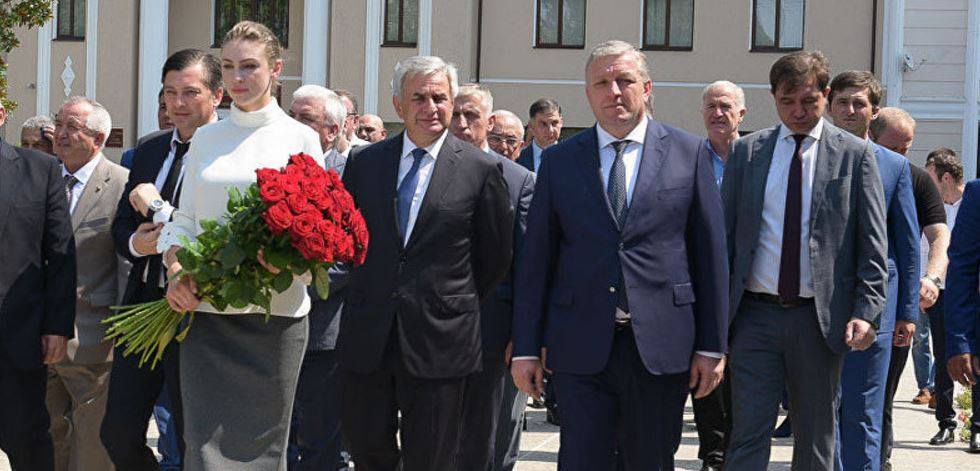

Protesters have stormed and seized the building of the Presidential Administration in Sukhumi (Sukhum), demanding that the results of the presidential elections be recognised as unlawful.
Hundreds of people gathered in front of the building on 9 January, in a demonstration organised by Abkhazian opposition parties Amtsakhara and United Abkhazia.
‘Khadzhimba, resign!’ Ekho Kavkaza reported protesters chanting outside the building, as several dozen other protestors broke inside on Thursday. The protestors demanded that last September’s presidential elections, in which incumbent President Raul Khadzhimba was re-elected, be recognised as unlawful.
[Read more on OC Media: Abkhazian president’s legal woes continue 47 days after election]
Videos and pictures posted on social media show the protesters breaking into the Presidential Administration building and damaging the furniture inside. The majority of the windows on the ground floor of the building were smashed as protesters broke in.
In the meanwhile, the Supreme Court of Abkhazia has started to consider the presidential runner-up Alkhas Kvitsiniya’s cassation appeal regarding the Supreme Court’s decision on 20 September to strike down Kvitsiniya’s bid to suspend the Central Election Commission’s (CEC) results.
According to Abkhaziya Inform, the court satisfied the plea of Kvitsiniya’s lawyer to recuse one of the judges, Roman Kvarchiya from considering the case.
Despite being sworn in in early October, legal challenges to Raul Khadzhimba’s election victory continue to mount.
On 23 October, the Supreme Court of Abkhazia dismissed a cassation appeal filed two days earlier by Human Rights Commissioner Asida Shakryl. Shakryl was also challenging the Supreme Court’s 20 September decision.
Elections
On 8 September, Abkhazia held the second round of presidential elections after none of the nine candidates crossed the 50% threshold required to win in the first round. In the first round on 25 August, Khadzhimba received 25% of the vote while Kvitsiniya came second with 23%.
According to the official results, in the second round, Khadzhimba received 47% of votes, Kvitsiniya received 46%, while the remainder voted ‘against all’, an option on the ballots.
Kvitsiniya, the chair of the opposition Amtsakhara Party, refused to concede after the polls closed. He has questioned the legitimacy of a winner who received ‘less than 50% of votes’.
While Khadzhimba was inaugurated on 9 October, his victory and all his decisions as president thereafter are still being legally disputed.
On 14 October, Khadzhimba reinstated Valery Bganba as Abkhazia’s Prime Minister, after Bganba’s powers formally ended and the government cabinet dissolved after Khadzhimba’s swearing-in on 9 October.
On 21 October, Khadzhimba also appointed Kan Kvarchiya as the new mayor of the capital Sukhumi.
Post-election ‘political crisis’
On 18 September, several civil society leaders, including Astamur Taniya, a close ally of first Abkhazian President Vladislav Ardzinba, urged Khadzhimba and Kvitsiniya, ‘irrespective’ of the Supreme Court’s decision on the election results, to pledge to undertake constitutional reforms.
They insisted that overcoming the ‘political crisis’ in Abkhazia would require moving from a presidential to a parliamentary form of government and adopting a mixed electoral system.
The following day, Raul Khadzhimba appealed to his supporters. He ignored the call for constitutional changes, instead announcing that Kvitsiniya had rejected his offer to be Prime Minister as a way out of the crisis.
Khadzhimba also said he had rejected Kvitsiniya’s counter-offer to appoint Aslan Bzhaniya as Prime Minister.
Bzhaniya, an Abkhazian MP, was replaced by Kvitsiniya as a candidate for the presidency after he fell suddenly ill and was hospitalised. The timing and seriousness of Bzhaniya’s illness triggered allegations among his supporters that he was poisoned.
[Read more on OC Media: Abkhazian presidential challenger vows to fight election despite ‘poisoning’]
Local news outlet Apsny Today quoted Bzhaniya as saying that he had returned from Berlin to Moscow on 13 October and was continuing his recovery there, which he said would last ‘about a month and a half more’.
For ease of reading, we choose not to use qualifiers such as ‘de facto’, ‘unrecognised’, or ‘partially recognised’ when discussing institutions or political positions within Abkhazia, Nagorno-Karabakh, and South Ossetia. This does not imply a position on their status.









